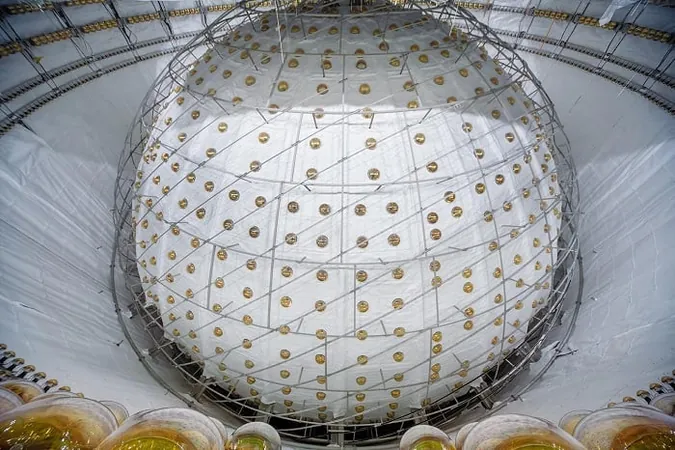
China's Cutting-Edge Neutrino Detector Set to Unlock Cosmic Secrets
2025-09-12
Author: Siti
A Glimpse into the World of Neutrinos
Neutrinos are some of the universe's greatest mysteries—particles that zip through our bodies at a staggering rate of 400 trillion per second, yet interact so rarely with other matter that studying them is like trying to catch shadows. But now, a groundbreaking new detector in China is on the case!
Meet the Jiangmen Underground Neutrino Observatory (JUNO)!
Located 700 meters underground, the JUNO lies between two massive nuclear power plants in Yangjian and Taishan, places bustling with the very neutrinos it aims to study. This strategic location promises a wealth of data—researchers anticipate capturing between 40 to 60 neutrino interactions daily over the next decade.
How Does JUNO Work?
Nestled beneath layers of rock to shield it from unwanted cosmic noise, JUNO employs a unique method to filter signals. It features a 'Top Tracker' that surrounds a 44-meter-wide pool of ultrapure water, poised to detect any stray particles that venture too close. Although it can't halt these intruders, it adeptly manages the data they might muddle.
Unlocking Neutrino Mysteries
Inside JUNO, a liquid scintillator sphere is equipped with 43,212 sophisticated photodetectors, ready to capture faint flashes of light when particles interact. This technology paves the way for scientists to discern differences among three types of neutrinos: electron, muon, and tau neutrinos, each possessing unique characteristics and the ability to oscillate between forms.
The Quest for Knowledge
One of JUNO's critical objectives is to decode the mass hierarchy of these elusive particles—determining which is lighter or heavier. By studying their oscillation frequency, researchers hope to uncover essential truths about how neutrinos influence the universe.
Why This Matters
Deciphering the neutrino puzzle could unlock transformative insights across various scientific fields: from cosmology, where they might shed light on the universe's expansion post-Big Bang, to astrophysics, where they could explain supernova phenomena, and even geology, revealing secrets about radioactive rocks deep within Earth.


 Brasil (PT)
Brasil (PT)
 Canada (EN)
Canada (EN)
 Chile (ES)
Chile (ES)
 Česko (CS)
Česko (CS)
 대한민국 (KO)
대한민국 (KO)
 España (ES)
España (ES)
 France (FR)
France (FR)
 Hong Kong (EN)
Hong Kong (EN)
 Italia (IT)
Italia (IT)
 日本 (JA)
日本 (JA)
 Magyarország (HU)
Magyarország (HU)
 Norge (NO)
Norge (NO)
 Polska (PL)
Polska (PL)
 Schweiz (DE)
Schweiz (DE)
 Singapore (EN)
Singapore (EN)
 Sverige (SV)
Sverige (SV)
 Suomi (FI)
Suomi (FI)
 Türkiye (TR)
Türkiye (TR)
 الإمارات العربية المتحدة (AR)
الإمارات العربية المتحدة (AR)